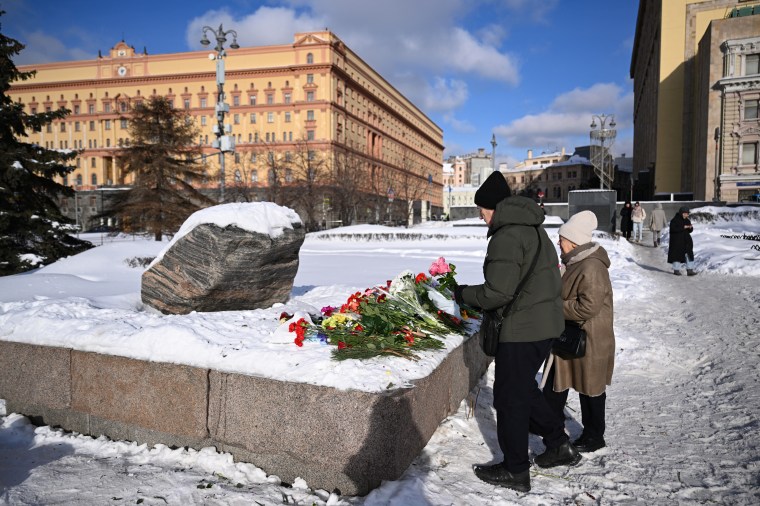New York, February 21, 2024—Russian authorities should refrain from detaining journalists who cover gatherings in memory of opposition leader Alexey Navalny and let members of the press report freely on events of public interest, the Committee to Protect Journalists said Wednesday.
At least four journalists were briefly detained last Friday and Saturday while reporting on gatherings to mourn Navalny’s sudden death in prison on Friday, February 16, according to media reports and three of the journalists, who spoke to CPJ via messaging app.
“The detention of at least four journalists covering the public expression of mourning by Russian people after the announcement of the death of opposition leader Alexey Navalny is not surprising given the Russian authorities’ long history of harassing journalists covering pro-Navalny demonstrations,” said Gulnoza Said, CPJ’s Europe and Central Asia program coordinator. “Journalists should be able to report on tributes to Navalny and freely cover events of public interest without fear of being detained.”
At about 9 p.m. last Friday, police detained Elina Kozich, a correspondent with independent news outlet RusNews, and Aleksei Dushutin, a photojournalist with the independent news outlet Novaya Gazeta, while they were covering a spontaneous memorial gathering for Navalny in Saint Petersburg, Kozich told CPJ and the independent news website SOTA reported. RusNews posted a video of Kozich being detained on Telegram.
“I had my press card on me, which the police officer saw, and I also told him that I was a journalist,” she told CPJ. “The officer himself did not introduce himself, did not tell me why I was being detained, but simply said, ‘Let’s go, press.’”
The two journalists were driven to the police station, where they were held in the police van for over an hour and had their press cards and IDs photographed, before being released, Kozich told CPJ.
Separately on Friday, police detained RusNews correspondent Yulia Petrova while she was doing a live broadcast from a square in Moscow, where people had come to lay flowers to a monument to the victims of political repression, Petrova told CPJ.
“After two hours of broadcasting I decided to move to the side where people were supposed to leave the square. A police officer was shouting that people can’t stand there even for a second. I stood for only two minutes, then an officer came and tried to grab my phone. Then another man came, he was not wearing uniform, his face was covered with a piece of cloth, and he was wearing a cap so I could only see his eyes. He grabbed my hand and started twisting my arm. The officer said that they will take me to the police truck and started threatening me but I said that I was not going anywhere with a man without uniform as it was not detention but kidnapping. Then they both twisted my arms and took me to the police truck,” she said. She stayed in the police truck for about 40 minutes, before being released, she told CPJ.
She added that she went to report on another gathering in Moscow last Saturday. “I heard on their [police] radio set that they had a direction [instruction] not to detain the press but they tried to prevent me from taking videos, pushed me and pressed me down many times. All my friends who came to lay flowers were detained, some of them are now under arrest,” she said.
At around 1 p.m. last Saturday, police in the central city of Chelyabinsk arrested RusNews correspondent Kseniya Starikova as she filmed an unidentified man removing flowers that had been placed in Navalny’s memory on a monument to the victims of political repression, RusNews reported and Starikova told CPJ via messaging app. Starikova said she was taken to the police station and released shortly after showing a digital photo of her press accreditation and editorial assignment document.
More than 400 people attending Navalny memorials in 36 Russian cities were detained on Friday and Saturday, the human rights news website OVD-Info reported.
Dozens of journalists have been detained in Russia in recent years while covering pro-Navalny protests, as CPJ has documented.
On February 21, the independent weekly Sobesednik reported that the outlet’s latest issue, dated from February 20 and featuring Navalny on the front page, had been withdrawn from distribution sites in Moscow, according to media reports.
“All this is very serious and even a little scary for us. We don’t know why the number was confiscated: we didn’t break any laws,” Sobesednik journalist Elena Milchanovska told the media group Ostorozhno Media. CPJ emailed Sobesednik for comment, but did not immediately receive any reply.
Navalny, who was 47 when he died in an Arctic penal colony, rose to prominence as a fierce critic of President Vladimir Putin. Navalny made global headlines in 2020 when he fell ill on a plane from poisoning with the nerve agent Novichok. Russia denied involvement. After months of medical treatment in Germany, Navalny returned to Russia in 2021 and was arrested upon arrival.
CPJ did not receive a response to its emails to Moscow, Chelyabinsk, and Saint Petersburg police requesting comment on the journalists’ arrests.
